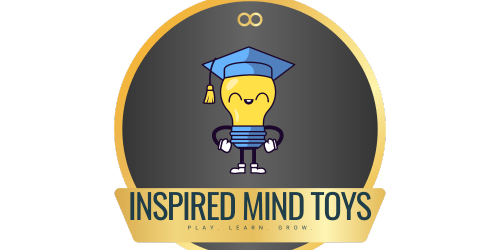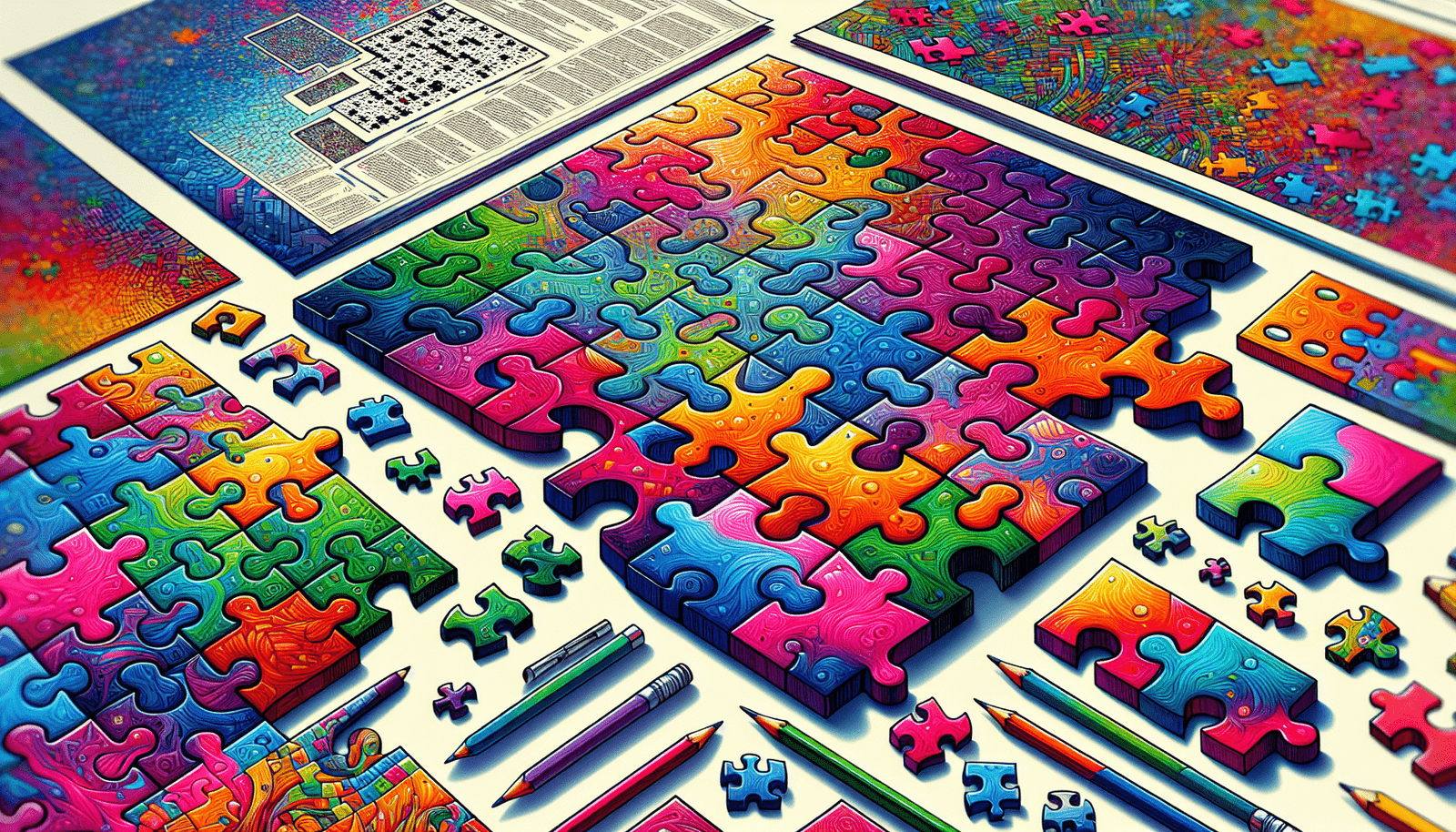Looking for engaging and educational activities for your children? Puzzle solving can be a great way to enhance their cognitive skills while keeping them entertained. In this article, we will explore the most popular types of puzzles for learning. Whether it’s jigsaw puzzles, word puzzles, or logic puzzles, each type has its own unique benefits for your child’s development. So, let’s dive in and discover the exciting world of educational puzzles!
Popular Types Of Puzzles For Learning
Importance of Puzzles in Learning
Puzzles have long been recognized as valuable tools for learning and development. They engage the mind, challenge critical thinking, and provide a sense of accomplishment when solved. Whether it’s a jigsaw puzzle, crossword puzzle, or sudoku, these brain-teasers offer numerous benefits that contribute to cognitive growth and enhance various skills. In this article, we will explore the importance of puzzles in learning and delve into the specific advantages offered by different types of puzzles.
Explanation of how puzzles can help improve cognitive abilities
Puzzles provide an excellent platform for improving cognitive abilities. When you tackle a puzzle, you are required to think critically, analyze information, and problem-solve. These mental processes help sharpen your cognitive skills, such as logical reasoning, attention to detail, and decision-making. Whether you are aligning the pieces of a jigsaw puzzle or deciphering clues in a crossword puzzle, your brain is constantly engaged, creating new pathways and improving overall cognitive function.
Importance of puzzles in developing problem-solving skills
Problem-solving is a fundamental skill that is nurtured through puzzles. As you encounter challenges and obstacles within a puzzle, your brain is stimulated to devise strategies and find solutions. By actively engaging in the process of overcoming difficulties, you develop problem-solving skills that extend beyond the puzzle itself and into real-life situations. Puzzles cultivate the ability to think creatively, adapt to new scenarios, and actively seek solutions, making them an invaluable asset for learners of all ages.
Benefits of puzzles in enhancing memory and concentration
Puzzles require focus and concentration, which can greatly improve memory and attention skills. When you invest time and effort into solving a puzzle, you train your brain to retain information and improve your ability to concentrate on specific tasks. This focused attention translates into other areas of life, helping you retain information, stay alert, and concentrate on your studies or work. By regularly engaging in puzzles, you can strengthen your memory and enhance your overall ability to concentrate.
Role of puzzles in promoting hand-eye coordination
Certain puzzles, such as jigsaw puzzles and 3D puzzles, actively promote hand-eye coordination. As you manipulate puzzle pieces, align patterns, or assemble intricate structures, you require precise hand movements and visual coordination. Engaging in these activities regularly can refine your motor skills, improve dexterity, and enhance spatial awareness. Not only does this benefit children who are in the crucial stages of physical development, but it also supports adults in maintaining and enhancing their hand-eye coordination.
Improvement in social skills through cooperative play
Puzzles, particularly jigsaw puzzles, can facilitate cooperative play and enhance social skills. Working on a puzzle collaboratively encourages communication, teamwork, and a sense of shared accomplishment. Whether it is with family members, friends, or classmates, solving puzzles together promotes effective communication, problem-solving, and the ability to work collectively towards a common goal. Additionally, it fosters patience, understanding, and respect for others’ perspectives, further strengthening social bonds and facilitating positive interactions.
Jigsaw Puzzles
Description and Features of Jigsaw Puzzles
Jigsaw puzzles consist of numerous interlocking pieces that need to be assembled to form a complete picture. They come in various themes, sizes, and difficulty levels, catering to individuals of all ages and interests. The pieces are made from sturdy materials, ensuring durability and providing a satisfying tactile experience.
Educational benefits of Jigsaw puzzles
Jigsaw puzzles offer numerous educational benefits. They foster cognitive skills such as shape recognition, spatial awareness, and problem-solving. By manipulating and fitting the pieces together, individuals develop fine motor skills and hand-eye coordination. Jigsaw puzzles also encourage patience, perseverance, and focus, as completing a puzzle requires sustained effort and attention to detail.
Popularity of Jigsaw Puzzles
Jigsaw puzzles have maintained their popularity throughout the years. They are a favorite pastime for many individuals and families, providing hours of entertainment and a sense of achievement. The wide range of themes, from landscapes to famous works of art, ensures that there is a puzzle suitable for everyone’s interests. Additionally, the accessibility of jigsaw puzzles, both in physical form and as online games, contributes to their widespread appeal.
Jigsaw Puzzles for various age groups
Jigsaw puzzles cater to individuals of all ages and skill levels. From simple puzzles with fewer pieces for young children to intricate designs for more experienced puzzlers, there is a puzzle suitable for every age group. Jigsaw puzzles for children often feature vibrant colors and larger pieces, making them visually appealing and easier to handle. For adults, more complex puzzles challenge their problem-solving skills and offer a greater sense of accomplishment upon completion. The variety ensures that jigsaw puzzles can be enjoyed by people of all ages, making them a versatile learning tool.
Crossword Puzzles
Understanding Crossword Puzzles
Crossword puzzles consist of a grid of squares, with each square corresponding to a letter. Clues are provided, and players must fill in the grid by answering the clues horizontally and vertically. Crossword puzzles can be found in newspapers, magazines, and online platforms.
Benefits of Crossword Puzzles in learning new words and improving vocabulary
Crossword puzzles are an excellent tool for improving vocabulary and expanding linguistic knowledge. They require the player to recall and apply their understanding of words, definitions, and synonyms. By regularly engaging in crossword puzzles, individuals are exposed to a wide range of words and their meanings, which in turn enriches their vocabulary. Additionally, crossword puzzles encourage problem-solving skills, critical thinking, and the ability to make connections between words and their contexts.
Why are Crossword Puzzles popular
Crossword puzzles have enjoyed enduring popularity due to their challenging yet rewarding nature. They provide intellectual stimulation and a sense of achievement upon completion. Crossword puzzles also offer a welcome break or diversion from daily routines, allowing individuals to relax and exercise their minds simultaneously. Moreover, the availability of crossword puzzles in various formats, such as newspapers, magazines, and online platforms, ensures that they remain accessible and appealing to a wide range of puzzle enthusiasts.
Guidance on choosing the right Crossword Puzzles
When selecting crossword puzzles, it is essential to consider the difficulty level and the target audience. Beginners may benefit from puzzles with simpler clues and smaller grids, gradually progressing to more challenging puzzles as their skills improve. It is also worthwhile to choose puzzles with themes or topics of interest, as they enhance engagement and motivation. Online platforms offer a variety of crossword puzzles, allowing individuals to select those that align with their skill level and preferences.
Word Search Puzzles
Insight into Word Search Puzzles
Word search puzzles consist of a grid of letters, with a list of words hidden amongst the letters. Players must locate and circle the words within the grid. These puzzles come in various sizes and difficulty levels, catering to different age groups and abilities.
Role of Word Search Puzzles in enhancing language skills
Word search puzzles offer a fun and engaging way to enhance language skills. By searching for and identifying words hidden within a grid of letters, individuals improve their pattern recognition, visual scanning, and word recognition abilities. Word search puzzles also reinforce spelling skills and expand vocabulary as players encounter new words. Furthermore, these puzzles encourage attention to detail, focus, and perseverance, as individuals must systematically search for each word within the grid.
Popularity and appeal of Word Search Puzzles
Word search puzzles have gained popularity due to their accessibility and the sense of accomplishment they provide. They are suitable for individuals of all ages and skill levels, making them enjoyable for both children and adults. The visually stimulating nature of word search puzzles, with words arranged in various directions, adds to their appeal. Additionally, the availability of word search puzzles in print and digital formats makes them accessible to a wide range of puzzle enthusiasts.
Tips for picking Word Search Puzzles
When selecting word search puzzles, it is essential to consider the complexity, themes, and target audience. For beginners or younger learners, puzzles with fewer words and simpler grids are recommended. Advanced word search enthusiasts may prefer puzzles with more challenging word placement and larger grids. Choosing puzzles with themes aligned with personal interests, such as specific topics or hobbies, enhances engagement and enjoyment. Online platforms offer a vast selection of word search puzzles, allowing individuals to find puzzles that match their skill level and preferences.
Sudoku Puzzles
Introduction to Sudoku Puzzles
Sudoku puzzles consist of a grid divided into smaller grid sections. The objective is to fill in the empty squares with numbers, ensuring that each row, column, and smaller grid contains all the numbers from 1 to 9 without repetition. Sudoku puzzles come in various sizes and difficulty levels, catering to individuals with different abilities.
How Sudoku Puzzles aid in developing logic and reasoning skills
Sudoku puzzles are renowned for their ability to develop logic and reasoning skills. By analyzing the given numbers and applying deductive reasoning, individuals can determine the correct placement of numbers in the grid. The process of solving Sudoku puzzles requires critical thinking, strategic decision-making, and the ability to evaluate multiple possibilities. Regular engagement with Sudoku puzzles strengthens logical reasoning abilities and enhances problem-solving skills.
Popularity of Sudoku Puzzles
Sudoku puzzles have seen a surge in popularity worldwide due to their addictive nature and mental benefits. People of all ages appreciate the mental challenge and satisfaction that comes from solving Sudoku puzzles. They provide a welcome break from screen time and offer a mentally stimulating activity that can be done individually or in a group. Additionally, the availability of Sudoku puzzles in print and digital formats ensures that they remain accessible and widely enjoyed.
Guidelines for selecting Sudoku Puzzles
When selecting Sudoku puzzles, it is essential to consider the difficulty level and the individual’s skill level. Beginners may find it helpful to start with puzzles labeled as easy or with smaller grid sizes. As skills progress, individuals can gradually tackle more challenging puzzles with larger grids. It is important to choose puzzles that provide a suitable level of challenge without becoming too overwhelming. Online platforms offer a wide variety of Sudoku puzzles, allowing individuals to select puzzles according to their preferences and skill levels.
Math Puzzles
Definition and functionality of Math Puzzles
Math puzzles are puzzles that incorporate mathematical concepts and problem-solving into their design. They present mathematical challenges and require individuals to apply their knowledge and problem-solving skills to find solutions. Math puzzles come in various formats, such as number puzzles, logic puzzles, and arithmetic puzzles, catering to different learning styles and abilities.
Educational benefits of Math Puzzles
Math puzzles offer numerous educational benefits beyond mere computation. They encourage critical thinking, logical reasoning, and the application of mathematical concepts in real-life contexts. By engaging with math puzzles, individuals develop problem-solving skills, gain a deeper understanding of mathematical principles, and improve their ability to approach mathematical challenges with confidence and creativity.
Reasons for the popularity of Math Puzzles
Math puzzles have gained popularity due to their ability to make math engaging and enjoyable. They provide a refreshing alternative to traditional exercises and worksheets, allowing individuals to explore mathematical concepts in a fun and interactive way. Math puzzles cater to individuals with different learning styles and abilities, ensuring that everyone can engage with math regardless of their initial aptitude. The sense of achievement and satisfaction that comes from solving math puzzles further contributes to their popularity.
Choosing the right Math Puzzles
When selecting math puzzles, it is important to consider the target audience and objectives. Puzzles should align with the individual’s current mathematical knowledge and challenge them appropriately. Beginners may benefit from puzzles that focus on foundational concepts and provide step-by-step guidance. Advanced learners may prefer puzzles that delve into complex mathematical principles and offer open-ended challenges. Online platforms offer a wide range of math puzzles, allowing individuals to explore different formats and select puzzles that suit their preferences and skill levels.
3D Puzzles
Understanding 3D Puzzles
3D puzzles are puzzles that require individuals to assemble three-dimensional structures. They are typically made of interlocking pieces, which, when combined, create a sturdy and detailed object. 3D puzzles come in various themes, ranging from famous landmarks to animals, offering individuals the opportunity to construct intricate and visually appealing models.
Role of 3D Puzzles in stimulating spatial perception
3D puzzles are excellent tools for stimulating spatial perception and enhancing visual-spatial skills. By manipulating and fitting the pieces together, individuals develop an understanding of how objects relate to one another in three-dimensional space. This spatial awareness fosters skills such as depth perception, perspective, and mental rotation. Regular engagement with 3D puzzles can strengthen these abilities and improve overall spatial perception.
Why 3D Puzzles are growing in popularity
The popularity of 3D puzzles continues to grow due to their unique and immersive nature. They provide individuals with a hands-on experience, allowing them to physically assemble and create tangible objects. This tactile engagement appeals to individuals seeking a more interactive and engaging puzzle-solving experience. Furthermore, the opportunity to construct detailed replicas of famous structures or beloved characters adds an element of excitement and personal attachment to the puzzles.
Guide to choosing 3D Puzzles
When selecting 3D puzzles, considerations such as complexity, themes, and age appropriateness are crucial. Beginners or young learners may benefit from puzzles with simpler designs and a smaller number of pieces. Advanced puzzlers may prefer intricate designs that present a greater challenge. Choosing 3D puzzles that align with personal interests, such as architecture, animals, or pop culture, enhances engagement and motivation. Online platforms offer a wide selection of 3D puzzles, allowing individuals to find models that match their skill levels and preferences.
Maze Puzzles
Overview of Maze Puzzles
Maze puzzles consist of intricate paths and dead ends, with the goal of reaching a specific endpoint. Players navigate through the maze by finding the correct route and avoiding obstacles. Mazes can come in various forms, including paper puzzles, interactive games, and physical mazes.
Benefits of Maze Puzzles for learning coordination and planning skills
Maze puzzles offer numerous benefits for learning coordination and planning skills. As individuals navigate through the maze, they must coordinate their vision and hand movements to follow the correct path. This promotes hand-eye coordination and fine motor skills. Maze puzzles also require individuals to plan their movements strategically, considering alternative routes and experimenting with different approaches. By engaging with maze puzzles, individuals enhance their problem-solving skills, spatial reasoning, and the ability to think ahead.
Popularity of Maze Puzzles
Maze puzzles have long been popular due to their universal appeal and the thrill of overcoming challenges. They offer a unique blend of entertainment and intellectual stimulation, making them suitable for individuals of all ages. The diversity of maze puzzles, ranging from simple mazes for children to complex mazes for adults, ensures that there is a maze puzzle for everyone’s interests and skill levels. Additionally, the accessibility of maze puzzles in various formats, such as print or digital puzzles, further contributes to their popularity.
Tips for selecting Maze Puzzles
When selecting maze puzzles, it is essential to consider the complexity and target audience. Puzzles with simpler designs and fewer dead ends are suitable for young children or beginners. More intricate mazes can challenge advanced puzzlers and offer a greater sense of accomplishment. Additionally, considering the maze’s theme or context, such as nature, science fiction, or historical landmarks, can enhance engagement and enjoyment. Online platforms provide a wide variety of maze puzzles, allowing individuals to choose puzzles that align with their preferences and skill levels.
Coding Puzzles
Introduction to Coding Puzzles
Coding puzzles, also known as programming puzzles, involve solving challenges related to computer programming. These puzzles require individuals to use coding languages and techniques to overcome obstacles and find solutions. Coding puzzles can be found in various formats, such as online platforms, mobile applications, or physical puzzle kits.
Educational advantages of Coding Puzzles
Coding puzzles provide numerous educational advantages, particularly in the field of computer science and programming. By engaging with coding puzzles, individuals develop logical thinking, problem-solving skills, and the ability to break down complex problems into manageable tasks. These puzzles reinforce coding concepts, familiarize individuals with programming languages, and nurture creativity and critical thinking. Additionally, coding puzzles encourage perseverance, as individuals must iterate and refine their solutions to overcome challenges.
Increasing popularity of Coding Puzzles
The popularity of coding puzzles has risen with the increasing importance of computer science and coding skills in the modern world. As technology continues to advance, there is a growing demand for individuals with programming expertise. Coding puzzles offer an engaging and interactive way to learn coding, making them attractive to learners of all ages. They provide a gamified approach to programming education, combining entertainment and education seamlessly.
Tips for choosing Coding Puzzles
When selecting coding puzzles, it is essential to consider the individual’s coding proficiency and objectives. Beginners may benefit from puzzles that introduce basic coding concepts and provide step-by-step guidance. Advanced programmers may prefer puzzles that challenge their coding skills and offer complex programming scenarios. Choosing puzzles that align with personal interests, such as game development, web design, or data analysis, enhances engagement and motivation. Online platforms offer a wide range of coding puzzles, allowing learners to explore different programming languages and problem-solving techniques.
Making Puzzle Learning Fun
Tips for making puzzle-solving engaging
To make puzzle-solving engaging, it is important to create a positive and stimulating learning environment. Here are some tips:
Set aside dedicated puzzle-solving time: Allocate regular time for puzzle-solving, allowing individuals to focus and immerse themselves in the activity without distractions.
Choose puzzles with varying degrees of challenge: Select puzzles that cater to different skill levels, ensuring a balance between achievable goals and stimulating challenges.
Incorporate rewards and incentives: Offer rewards or incentives to motivate individuals and acknowledge their efforts. This can range from small treats to personalized rewards that align with their interests.
- Encourage collaboration and friendly competition: Foster a sense of camaraderie and healthy competition by involving others in puzzle-solving activities. This can be done through cooperative play, puzzle races, or team challenges.
Importance of patience in puzzle solving
Patience is a crucial attribute when it comes to puzzle-solving. Encourage individuals to approach puzzles with a patient mindset, understanding that some puzzles may take time to solve. Emphasize the value of persistence and the satisfaction that comes from overcoming challenges through perseverance. Cultivating patience in puzzle-solving extends to other areas of life, teaching individuals the importance of resilience and a positive attitude in the face of difficulties.
Creating a conducive learning environment with puzzles
Creating a conducive learning environment with puzzles involves providing the necessary resources and support. Here are some suggestions:
- Organize a dedicated puzzle area: Set up a designated space for puzzles, ensuring there is enough room for individuals to work comfortably and spread out the puzzle pieces.
- Provide a variety of puzzles: Offer a diverse range of puzzles to cater to different interests and abilities. This ensures that individuals have options and can select puzzles that align with their preferences.
- Offer guidance and assistance: Be available to provide guidance and assistance when needed, particularly for younger learners or individuals who may require additional support. Encourage individuals to ask questions and seek clarification when faced with challenges.
- Display completed puzzles: Celebrate the completion of puzzles by displaying them in a common area. This fosters a sense of accomplishment and appreciation for the effort put into solving the puzzles.
Motivating and encouragement while solving puzzles
Motivation and encouragement play a vital role in puzzle-solving. Here are strategies to inspire individuals:
- Provide positive reinforcement: Offer praise and encouragement throughout the puzzle-solving process, highlighting the progress made and the skills demonstrated.
- Celebrate milestones: Acknowledge and celebrate milestones and achievements in puzzle-solving, whether it’s completing a particularly challenging puzzle or reaching a personal best time.
- Share success stories: Share success stories of others who have overcome challenging puzzles or achieved impressive puzzle-solving feats. This can inspire individuals and illustrate the possibilities that come with dedication and perseverance.
- Foster a supportive community: Create a supportive community of puzzle enthusiasts, whether it’s through online forums or local puzzle clubs. Encourage individuals to share their experiences, seek advice, and celebrate collective achievements.
In conclusion, puzzles offer a valuable avenue for learning and development. They enhance cognitive abilities, promote problem-solving skills, boost memory and concentration, improve hand-eye coordination, and foster social skills through cooperative play. Whether it’s jigsaw puzzles, crossword puzzles, word search puzzles, sudoku puzzles, math puzzles, 3D puzzles, maze puzzles, or coding puzzles, each type provides unique benefits and appeals to different interests and abilities.
By incorporating puzzles into learning environments and making the experience enjoyable and engaging, individuals can harness these educational advantages and cultivate a love for puzzle-solving. So, grab a puzzle, challenge yourself, and embark on a rewarding journey of learning and discovery.
Interested in seeing the products we use?
Check out our carefully crafted list of items






